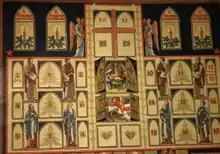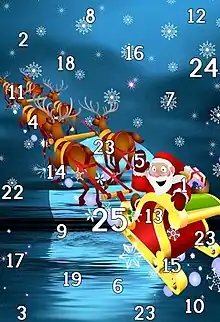Advent calendar
An Advent calendar is a special calendar that counts the days to Christmas through the month of December.[1] Most of them start on the first day of December, but sometimes they include the last few days of November because of the Christian advent.[2][3] The advent calendar was used first by German Lutherans from 1800 to 1900, but now many Christians use them.[4][5]

Looks and use
Advent calendars have pictures on them that show either the Christian nativity scene, Santa Claus, or a winter landscape. However, there are also many different looks, such as sports or technology.[6] They can either be made of paper, wood or fabric.
Many Advent calendars and large cards shaped like a rectangle, with little "windows" that can be opened.[5] There are usually 24 windows on a card, one for each day from December 1 to the day before Christmas. Each window has a number, and you open one each day. For example, on December 16, you would open the window with a '16' on it.[2][3] There are sometimes pictures, poems, or even chocolate behind each window. Other calendars have Bible verses or a prayer behind the windows, which Christians use to celebrate their Advent as part of their religion.[4][7] Advent calendars can also have puzzles or games behind the windows.
There are many different kinds of Advent calendars. Some are made online on social media, and some towns have made living advent calendars.
Related pages
References
- Penney, Sue (1999). Christianity. Heinemann. p. 38. ISBN 9780435304775.
In Advent, Christians use special candles and calendars. Advent candles have marks to show the days until Christmas. The candle is lit each day until it burns down to the next mark. Advent calendars have little doors to open, one for each day. Behind each door is a picture. Candles and calendars like this help to remind people that Christmas is coming closer.
- "Online Advent calendar created by the world". Anglican Communion News Service. November 17, 2016. Retrieved December 8, 2016.
Christians across the world are being invited to celebrate the season of Advent through an interactive, multi-lingual online calendar. The website adventword.org goes live on Advent Sunday (27 November) in nine languages including, for the first time, Arabic. It allows people around the globe to create together an advent calendar with images shared by their mobile phones. Advent, which runs from Sunday 27 November to Christmas Eve, is the season when Christians prepare to celebrate the birth of Jesus. It is traditionally marked with the putting up of an Advent calendar to count down the days. The calendars have daily windows which are opened to reveal images, small chocolates or other gifts.
- Mac Donald, Sarah (November 26, 2014). "Primate launches online calendar for Advent". Catholic Ireland. Retrieved December 8, 2016.
The Primate of All Ireland, Archbishop Eamon Martin, on Tuesday launched a specially commissioned 2014 Advent calendar to coincide with the beginning of Advent on Sunday 30 November. The online calendar can be found on the Irish Catholic bishops' website www.catholicbishops.ie. This year's calendar also incorporates a new feature in the form of an audio 'Thought for Today'. In a statement, the Archbishop said "Each day of Advent amounts to a period of time which allows us to journey and reflect on 'the joy of the Gospel." "As Advent is the season of preparation for the coming of our Lord, I encourage the faithful, notwithstanding our hectic schedule over the coming weeks, to make time to pray – alone and with loved ones – and by so doing to draw nearer to Christ," Archbishop Martin encouraged. The first door on the Advent Calendar will open on Sunday next 30 November and each subsequent day after that.
- Mills, T.J. (May 10, 2010). The Twelve Blessings of Christmas. Thomas Nelson Inc. p. 54. ISBN 9780529124319.
The Advent calendar was first used by Lutherans in the early 19th century. Early printed Advent calendars had Bible verses behind little cardboard doors.
- Gassmann, Günther; Larson, Duane H.; Oldenburg, Mark W. (April 4, 2001). Historical Dictionary of Lutheranism. Scarecrow Press. p. 87. ISBN 9780810866201.
The periods of Advent and Christmas have been especially dear to Lutherans and have provided ground for the creation and observation of customs: the rich tradition of hymn singing and church music, the Advent wreath as a sign of Christ's victory, the Advent calendar with its "windows," candles symbolizing new light in darkness, the varieties of Advent and Christmas cookies (gingerbread, fruit loaf, and so on) with several spices (originally seven, the holy number), the Christmas tree with glittering decoration and self-made figures and symbols as a reminder of the gold and treasures that the three wise men brought to the Christ Child, the cribs and tableaus within and out front of the churches and houses, and the greeting of Christmas morning by hymns and carols blown by trumpets and trombones from church towers.
- MacBeth, Sybil (November 1, 2014). The Season of the Nativity. Paraclete Press. p. 50. ISBN 9781612616131.
The variety of Advent calendars is endless, and they are available online, in bookstores, and even in some grocery stores. The "old-fashioned," meaning twentieth-century and earlier versions, are made of paper and often include pictures of Santa Claus, the manger, or winter weather. Most calendars have twenty-four little paper doors; behind each is a picture or a Bible passage.
- Black, Vicki K. (January 9, 2004). Welcome to the Church Year: An Introduction to the Seasons of the Episcopal Church. Church Publishing, Inc. p. 17. ISBN 9780819225757.
The Advent Calendar: Another way to mark the progress of Advent is the Advent calendar. Again, many children enjoy this hands-on way of keeping Advent, and families can incorporate prayers and brief Scripture readings or nativity stores into the daily ritual of opening the Advent calendar.
Other websites
- Taylor, Alan (November 30, 2012). "2012 Hubble Space Telescope Advent Calendar". The Atlantic.
